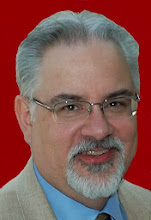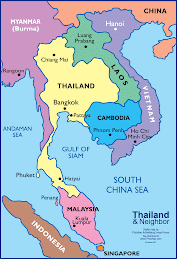Then Jesus called the twelve together and gave
them power and authority over all demons and to cure disease, and he sent them
out to proclaim the kingdom of God and to heal. He said to them, ‘Take nothing
for your journey, no staff, nor bag, nor bread, nor money --- not even an extra
tunic.’ - (Luke 9:1-13 NRSV)
As I made the 30+ hour journey through the air from Syracuse to Bangkok I
reflected on this text from the Gospel of Luke.
In part, because the method of modern sabbatical-taking seems contrary
to how the gospel writer describes Jesus’ method in deploying the disciples for
their first experience in the practice of ministry. As Luke describes it, it seems very spur of
the moment and slipshod. These learners
in the ways of God’s Kingdom awaken one morning to learn that Jesus is sending
them out to put into practice all they learned while accompanying him through
the countryside and sitting as learners at his feet. Their intensive learning experience with the
Master has concluded. Graduation day has
come and they are sent forth as practitioners in the arts of proclamation and
spiritual healing.
What is particularly surprising is Jesus’ instruction to take nothing for
the journey. They’re not allowed to grab
to an extra change of clothes, their credit cards, or a tuna fish sandwich for
the road. Apparently, no advanced
planning has taken place. They don’t consult a travel agent or book hotel
rooms. No demographic analysis of the
communities they will visit has been conducted.
No needs surveys have been distributed, collected, and tabulated. No feasibility studies have been
drafted. Instead, they simply head out
to proclaim that the Kingdom of God has come and to offer healing of body and
soul. They are to stay where they are welcomed and shake the dust from their
sandals when the door is slammed in their faces.
Contrast Jesus’ method in sending out The Twelve with what is necessary
to plan, fund, and implement a sabbatical period for a pastor and congregation.
For several years, the Staff Relations
Committee and I have occasionally discussed the possibility of and need for a
sabbatical. In 2011, SRC chair, Rev. Jim
Dick, encouraged me to move from talk to action. In early 2011, the committee and I began
working on the process of submitting a sabbatical grant application to the
Lilly Endowment. Other church leaders
where brought into the conversation. Presentations were made to Ministry Teams and
the Ministry Coordinating Council. Votes
of affirmation were taken. A lengthy
application that included a sabbatical plan, proposed budget, congregational
and professional data, and denominational endorsement was submitted to the
Lilly Endowment. The following
September, Lilly informed us that Tabernacle had been awarded the requested
granted. Contracts were signed. By November 2012 the funds had been received,
and work was just beginning!
We next formed a special search committee to identify and call a
Short-term Interim Pastor to provide leadership and pastoral care to the
congregation during the four month sabbatical period. In the providence of God, Rev. Dr. Marilyn
Biassa, a recently retired United Methodist pastor with a rich history of
cross-cultural ministry and academic experience, accepted the call to serve in
this important role.
For me, at times, the preparation for the sabbatical has seemed almost
endless. As soon as I have checked one
task off from my “to do” list, another task is added. Countless emails have been exchanged. Karen Baptist leaders in Burma have
graciously agreed to host me, provide me with lodging, and arrange an itinerary
of visits to seminaries, Bible Schools, and churches. ABC International Ministries has allowed me
to join a group in Burma to attend the Myanmar Baptist Convention’s Judson
Bicentennial celebration and visit significant Judson sites.
In addition, airfare has been purchased and hotel/guest house accommodations
reserved. A business visa to enter
Myanmar has been applied for and received. Emergency medical insurance has been
purchased. I’ve visited my doctor and a
travel clinic to receive tetanus and polio boosters, a thyoid inoculation, and
prescriptions for doxycyclene (anti-malaria prophylaxis) and ciprofloxacin (at
the ready, if needed, to combat gastro-intestinal infection). I’ve sprayed my clothing with a special
mosquito repellant that is guaranteed to last for six washings!
Then, there is the matter of what clothing to bring --- 5 pairs of pants,
too many shirts, 7 days worth of underwear and socks, two pairs of shoes,
sandals, a lightweight rain jacket, and fleece jacket for when I return to
frozen Upstate New York. But, this is just
the tip of the iceberg. There is also
the question, “What other stuff do I need to haul to Burma and back?” My toiletry kit is well stocked. Hand sanitizer, lots of Kleenex and wet
wipes, and a small kit with bandaids and antiseptic wipes are also packed. I have an ample supply of insect repellent
and sunscreen on hand. A compact Bible
and notebook are in my carry-on.
As someone who lives in a digital world, I admit to bringing far more
digital devices than necessary --- an ultra-book (small, lightweight laptop
computer), a Nook reader, my smartphone, and two digital cameras. All of this electronic stuff of course necessitates
bring along the appropriate cords, chargers, and power-adapters.
So, how does one reconcile Jesus’ command to The Twelve to “take nothing
for your journey” with all that I am bringing on my sabbatical journey? And, what about the unplanned character of
the sending out of the disciples versus the extensively planned nature of my
sabbatical journey? The too easy answer
is, “Well, I live in a very different world than Jesus and the disciples.” A better answer, I believe, is found in asking
why Jesus sent the disciples out as he did.
It was to open them up to others in their dependence on others’
hospitality. It was to open them to how
God would use them and provide for them.
It was to free them from the obsession about one’s own welfare and
security that blinds us to beauty and potential God desires us to see.
The truth is, how one handles the preparations and precautions that are
part of a lengthy journey into a different culture a long way from home is a
tricky thing. I don’t think the answer
to is head out without any preparation and having taken no precautions. But, there are also great dangers in the opposite
approach. Particularly, for those of us
who live in a materialistic culture. One
of the great lies of materialism is that our worth, identity, and security is
defined by the stuff we possess. And,
yes, I acknowledge I have been formed
and shaped by my culture.
Here are some of the questions I
am asking myself as I begin my time in Thailand and Burma. Does what I have done to prepare for this
sabbatical journey and what I have brought with me give me a false sense of
security? Does it isolate me from others
or open me up others? Do I have a sense
of security because of technology I possess?
Or, am I secure because the eternal One walks with me and promises to
guide my steps? Am I free and willing to
discover the new experiences and new learning God is prepared to teach me in
this time? Is this journey an expression
of my commitment to proclaim the good news that God’s kingdom is at hand and to
be an agent of God’s healing and hope?

